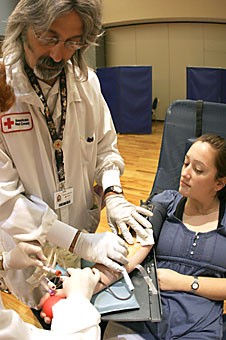Calling all graduates, professionals, undergraduates, faculty and staff – the Graduate and Professional Student Council wants your blood.
Twice a year, the GPSC teams up with the American Red Cross to put on a campus-wide blood drive; this year, everything is being condensed into one space, the Grand Ballroom of the Student Union Memorial Center. Holding the blood drive in one location will make the donation process faster and more productive, said Anne Murdaugh, GPSC assembly chair.
The blood drive began yesterday and will continue today from 8 a.m. to 4 p.m. with the goal of collecting 220 units of blood. One donator equals one unit.
Within three hours yesterday, 66 people had donated one pint of blood each, falling short of the day’s goal of 120 units.
Today’s goal is set at 100 units of blood, said Cori Schwarz, recruitment representative for the Red Cross.
“”The ultimate goal would be to see 200 people each day,”” she said.
Laura Arguedas, an applied biosciences graduate student, donated blood for the first time in America yesterday.
“”Last year I was in a car accident and I needed blood, so this year I am giving back,”” she said.
Patrick Hayes, a sophomore majoring in journalism and media arts, donated blood last week at Maricopa Residence Hall, but came out yesterday to give moral support to Destiny Pina, a psychology sophomore.
Pina was giving blood for the first time, adding that she had been wanting to do it for a while.
“”I just want to help out,”” she said.
A person can donate blood every 56 days and donations take about 45 minutes. It takes 15 to 20 minutes to fill out the health history, 20 to 25 minutes to donate blood and 10 to 15 minutes to recover at the canteen, said Heather Tighe, a donor service technician for the Red Cross.
“”Some people feel dizzy or lightheaded after donating blood, especially if it is their first time, so spending some time in the canteen is important,”” she said.
While sitting at the canteen, donators are encouraged to eat and drink something to get their blood sugar back up, said Anne Murdaugh, a physics graduate student.
To help recharge, the canteen offers a number of goodies, including Nutter Butter bars, Famous Amos cookies, Cheez-Its, pretzels or raisins, and water, juice or soda.
Women who are at least 5 feet 5 inches tall and 175 pounds or heavier, and men at least 5 feet 1 inch tall and 150 pounds or heavier, are encouraged to donate through the Double-Red, a computer system that withdraws blood and then separates it to plasma platelets and red cells, said Terry Ncube, donor services technician for the Red Cross.
The Double-Red collects red blood cells and returns the plasma platelets and saline to the donor, a process that takes about 35 minutes and helps donors feel hydrated by the end of the process.
For Eyad Nusayr, a cell biology and anatomy graduate student, donating through Double-Red is old hat; his donation yesterday marked his fourth in two years.
“”Donating blood this way is good for you because it excites the bone marrow to produce fresh red blood cells and plasma,”” he said. “”You’re helping someone else and you only lose two units of blood, which is nothing.””
To donate through Double-Red, a technician enters the person’s body information, weight and height into a computer, which understands how much blood to draw to get the correct amount of red cells, Ncube said.
The amount of red blood cells the person is able to donate depends on their body mass.
A person can donate blood through the Double-Red only every 112 days, and only five people in Arizona are certified to take blood this way, Ncube said.
All the blood donated yesterday and today will stay in Tucson and be given to local hospitals, Schwarz said.
Although many types of blood are needed, the Red Cross is looking specifically for blood types O-positive, O-negative, B-negative and A-negative, she said.
To donate blood, a person can walk into the Grand Ballroom and sign up, or go online to www.govlife.org and put in the sponsor code – “”wildcat”” – and pick their time.
Before giving blood, donors are encouraged to drink lots of water and eat a balanced meal.
“”We need a lot of people (today), so please come donate,”” Schwarz said. “”Give it up, it is just a pint of blood.””









